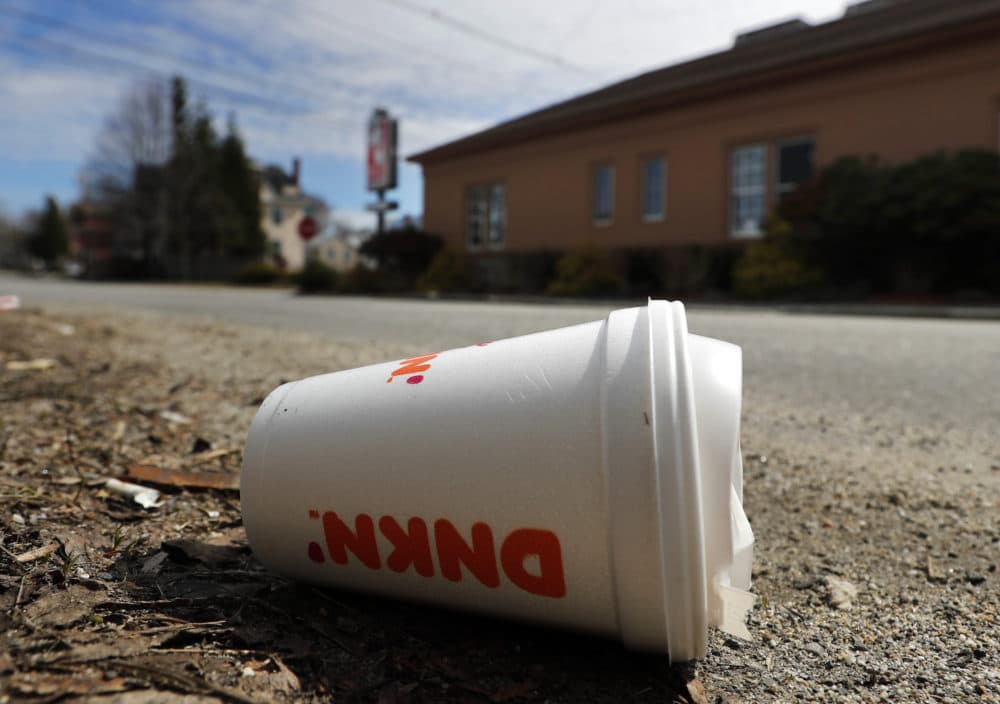Advertisement
Food Container Bill Spurs Debate Between Lawmakers, Industry

The leaders of the Joint Committee on Public Health and representatives of the food container industry could not see eye-to-eye Tuesday during a hearing on bills to restrict the use of polystyrene food containers and utensils, legislation that one co-chair said the committee is interested in backing again this session.
Advocates from the Massachusetts Public Interest Research Group (MASSPIRG) and Environment Massachusetts, and Rep. Dave Rogers told the committee they support bans on single-use plastic products like foam cups and clamshell take-out containers because of the health and environmental risks associated with them.
"I think we all know very well that single-use plastic products including polystyrene foam cups and takeout containers are a major source of pollution in our rivers, streams and oceans. Fragments of plastic have been found in hundreds of species, which can block their digestive tracts and lead to starvation and, additionally, plastic waste washing up on our beaches in riverbanks is an eyesore," Ben Hellerstein, state director for Environment Massachusetts, said. "For all these reasons and more, there's more than 100 communities across Massachusetts that have already taken action to restrict the use of plastic products."
But officials from Dart Container, one of the world's largest manufacturers of polystyrene food service containers, and the American Chemistry Council said the arguments made by bill supporters were overstated.
"The reason why I'm opposed to this, obviously, is there's a lot of misinformation out there," Christine Cassidy, recycling manager for Dart Container, said. She said landfill waste audits have found that polystyrene food service containers make up about 1% of landfill waste versus about 30% made up by food waste.
That number didn't sit well with committee co-chair Sen. Jo Comerford, who said the committee's own research on the topic found that polystyrene was responsible for something along the lines of 25-30% of landfill waste.
"One percent is just not a number I've ever heard," she told Cassidy, who did not provide a direct citation for her figure.
None of Dart Container's testimony sat well with House co-chair Rep. Marjorie Decker, who filed one of the polystyrene ban bills that got a hearing Tuesday.
"There's a lot of things in there that I do not think were accurate. We actually have done our due diligence, we do believe this will make a tremendous impact," Decker said.
Decker was equally displeased with the testimony from Omar Terrie, director of packaging advocacy for the American Chemistry Council, who told the committee that it ought to consider both a risk assessment — whether something can be of concern to human health — and an exposure assessment to determine at what level of exposure the substance becomes a concern.
The International Agency for Research on Cancer, which classifies styrene as possibly carcinogenic to humans, only conducted a risk assessment, he told the committee.
"So hazard assessment talks about is something of concern. And if you stop at that point, which IARC does, water is a concern to human beings because water, you can die from drinking too much, water can become a poison," Terrie said. He added, "And so when you look at both the hazard assessment and the exposure assessment combined, when it comes to food service, polystyrene foam food service is of no health concern to the consumer. It has been FDA-approved for over 50 years. There is no health concern to the consumer."
Decker, who led a previous effort on Beacon Hill to ban certain uses of flame retardant chemicals, offered a pointed response to Terrie's testimony after making sure the committee's three-minute time limit was strictly applied to him. She said his organization "kind of stayed in the forest for four years and didn't publicly testify to oppose my [flame retardents] bill."
"It's just great to now see the American Chemistry Council come out of the forest, come out of hiding, and actually now publicly provide both me and the public what their thoughts are on why these chemicals should continue to be produced, even when it's at the expense of our health," she said. "So I'm just really happy that they're actually engaging in this kind of public dialogue because that's not what my experience was over a period of four years."
During Tuesday's hearing, Comerford pointed out that the Committee on Public Health advanced a polystyrene ban bill last session, but that it never went to the floor of the House or Senate for a vote after the pandemic reordered legislative priorities last year.
She said she thinks the committee could do the same this session.
"I do believe this joint committee has an interest in that work," Comerford said.